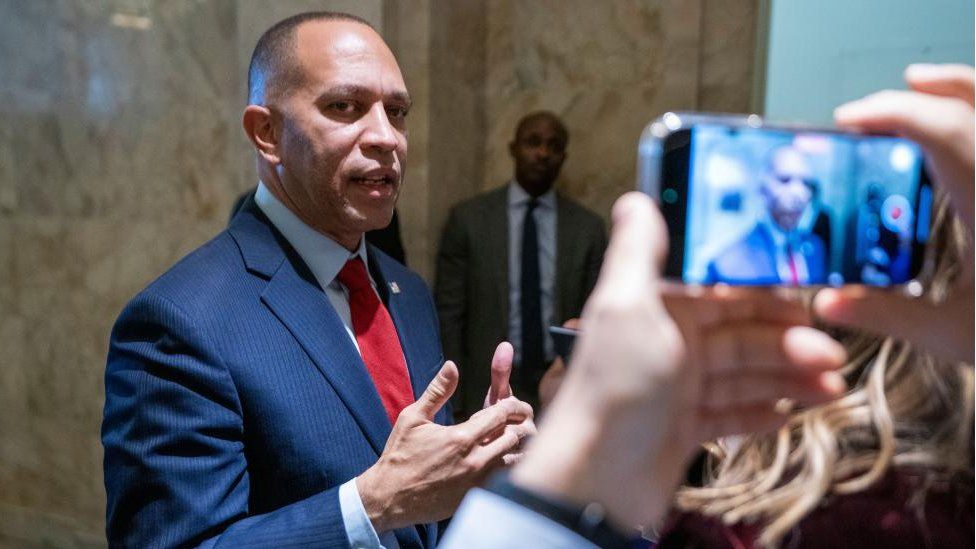Can Jim Jordan become the next Republican House Speaker?
Jim Jordan’s bid to become Speaker of the US House of Representatives is building momentum as he wins over opponents among his fellow Republican lawmakers – but a handful of holdouts remain.
The Ohio congressman said on Monday he was feeling “really good” about clinching the 217 supporters he needs to win the position on the eve of an expected vote.
Mr Jordan, a founding member of the ultra-conservative House Freedom Caucus, seems to be inching closer to the gavel after gaining key endorsements from former detractors.
The number of fellow Republicans withholding support for his candidacy had dwindled to about 10 by Monday – down from more than 50 on Friday who had refused to back him.
While the total number of remaining no-votes is unclear, the House Judiciary Committee chairman can only afford to lose four Republicans.
It has been almost two weeks since the House ousted its Speaker. The vacuum at the very top of the US government has left the lower chamber of Congress unable to carry out its most basic functions.
Can Jordan win?
Mr Jordan is backed by many conservative Republicans and counts on former President Donald Trump as a strong ally.
Several moderate lawmakers had previously expressed reluctance to vote for him. Some of them, such as Missouri’s Ann Wagner and Alabama’s Mike Rogers, backtracked on Monday and declared their support for Mr Jordan.
House Armed Services Committee chairman Mr Rogers – who reportedly said last week that there was little Mr Jordan could do to sway him – wrote on social media that the two had “cordial, thoughtful and productive conversations over the past two days” and eventually came to agree on several policy points.
In a letter to colleagues on Monday, Mr Jordan vowed to unite his party as he scrambled to consolidate support a day before the expected floor vote.
“The principles that unite us as Republicans are far greater than the disagreements that divide us,” he wrote.
“The country and our conference cannot afford us attacking each other right now. It is time we unite to get back to work on behalf of the American people.”
He picked up seven endorsements from his Republican colleagues on Monday.
According to Axios, he has signalled that if he wins he will allow the chamber to vote on linking funding for Israel and Ukraine, which would be likely to pass with Democratic support. Fierce resistance to Ukraine war funding among Republican hardliners, including Mr Jordan himself, contributed to the ousting of the previous Speaker, Kevin McCarthy, on 3 October.
In his 16 years in Congress, Mr Jordan has faced criticism for his record. He was once labelled a “legislative terrorist” by former Speaker John Boehner.
Colleagues have also expressed concern over his past disruptive tactics, as well as his reported efforts to undermine Steve Scalise’s bid for the speakership last week.
Mr Scalise, a long-time deputy of the last Speaker, Mr McCarthy, ended a short-lived bid for the gavel after failing to win enough support.
Others have argued that Mr Jordan is not adept at fundraising; Speakers are expected to get donors to open their chequebooks for the party.
But he and his supporters are betting those opposed to him will eventually fold so as not to prolong Republicans’ internal dysfunction.
Other ways this can end
1. Another Republican gets 217 votes

Some of the anti-Jordan holdouts are currently working to suggest an alternative candidate who could get more support from the party’s centrist wing.
On Friday, it was Austin Scott, a little-known Georgia congressman who announced he was running for Speaker mere hours before Republicans met to cast an internal ballot.
Mr Scott won as many as 81 votes for a bid he conceded was more about providing opposition than about winning the gavel.
If Mr Jordan fails, more names will be floated in the coming days.
They include Tom Emmer, the third-highest ranking House Republican, and Kevin Hern, chairman of the conservative Republican Study Committee.
Allies of Mr McCarthy have also left the door open to reinstating him as Speaker.
As things stand, all these options appear unlikely.
2. A temporary Speaker

Another way to end the House’s paralysis would see acting Speaker Patrick McHenry be granted extra powers on a temporary basis – for up to 30 or 90 days.
This would allow the House to function – and avoid a government shutdown in a month’s time – while a longer-term solution is found.
This would require some co-operation from Democrats to work out the details.
3. Democrats to the rescue

A third option would be for Republicans to agree with Democrats on a consensus Republican candidate.
This option, however, would entail concessions to the minority party. Democrats want to eliminate a new rule introduced in January that gives any member the power to bring a vote to the floor to overthrow the Speaker.
Some lawmakers have suggested that five Republicans could switch sides and back Minority Leader Hakeem Jeffries for Speaker – but that looks very unlikely.
How it affects the real world
Without a Speaker, the House is unable to pass any bills or approve White House requests for emergency aid. That includes potential help for Israel amid its ongoing fight with Hamas.
In a sign of the growing impatience, the Senate is expected to take up an Israel aid package when it returns to session this week, hoping to put more pressure on the House to resolve its crisis.
A leaderless House also means that Congress is unable to pass any spending bills – even short-term measures – that would allow the government to avoid a potential shutdown in mid-November.
Speaking to the 60 Minutes programme on Sunday, President Joe Biden said he was concerned that Republicans no longer “look at [democracy] the same way you and I look at democracy”.
